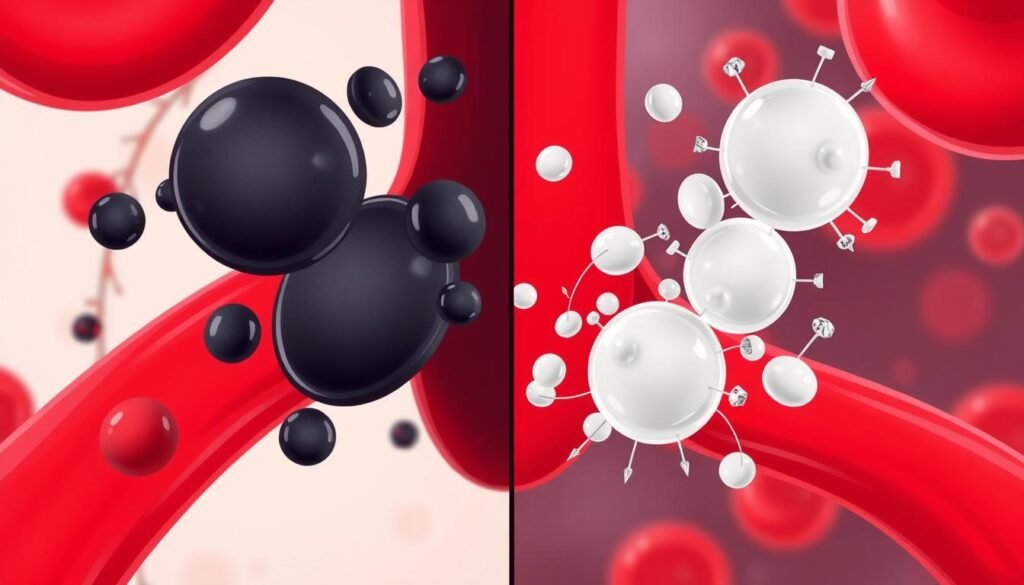What if everything you knew about cholesterol was not quite right? Many see cholesterol levels as just a risk without understanding the full story. Yet, comprehending the roles of low-density lipoprotein (LDL) and high-density lipoprotein (HDL) changes this view.
This exploration sheds light on how these cholesterol types impact health. It shows why knowing the difference is key. We will uncover why it’s vital to understand each’s effects on the body.
Key Takeaways
- LDL is often termed “bad” cholesterol while HDL is known as “good” cholesterol.
- Understanding cholesterol types is vital for managing cardiovascular health effectively.
- Cholesterol levels can be influenced by various factors, including diet and lifestyle.
- Being informed about the difference between LDL and HDL can lead to better health choices.
- Regular testing of cholesterol levels is essential for maintaining heart health.
What is Cholesterol?
Cholesterol is a waxy substance, similar to fat, that’s needed for many body functions. It’s found in all cells and is crucial for making hormones, vitamin D, and substances that help digest food. Knowing about different kinds of cholesterol is important for keeping healthy cholesterol levels.
Definition and Types of Cholesterol
Cholesterol comes in two main types:
- LDL cholesterol (Low-Density Lipoprotein): Often called “bad” cholesterol, high levels of LDL can clog arteries, raising heart disease risk.
- HDL cholesterol (High-Density Lipoprotein): Known as “good” cholesterol, HDL helps clear cholesterol from the blood, reducing heart problem risks.
https://www.youtube.com/watch?v=0U7YHRW5dyc
The Role of Cholesterol in the Body
Cholesterol is key for many body processes. It’s essential for building cell walls and keeping cells healthy. Cholesterol is also the starting point for making vital hormones, including cortisol and sex hormones. Moreover, it’s important for absorbing vitamins that dissolve in fat.
Knowing the difference between LDL and HDL cholesterol is important. It helps keep your health in check and prevents diseases related to cholesterol imbalance.
The Difference Between LDL and HDL
Understanding the difference between LDL and HDL cholesterol is key for heart health. These cholesterol types play different roles in our body and impact our health differently. Knowing how they work helps us take better care of our hearts.
Understanding LDL Cholesterol
LDL cholesterol is often called “bad” cholesterol. It can build up in artery walls and lead to plaque formation. This buildup narrows arteries and raises heart disease risk. Keeping an eye on LDL levels is crucial, and regular blood tests are necessary.
Understanding HDL Cholesterol
HDL cholesterol is the “good” kind. It carries excess cholesterol from arteries to the liver for removal. This action protects the heart and lowers the risk tied to high LDL levels. High HDL levels are good for your health and cholesterol balance.

LDL vs. HDL: The Good and Bad Cholesterol
It’s key to know what LDL and HDL do for heart health. LDL or “bad” cholesterol, when high, ups heart disease and stroke risk. Knowing the difference makes choosing healthy foods and activities easier.
The Impact of LDL on Health
LDL cholesterol can lead to artery plaque, causing atherosclerosis. This can seriously increase your heart disease risk. If LDL goes up, you might face heart attacks and more. It’s key to keep cholesterol balanced. Check out your cholesterol numbers here to stay safe.
The Benefits of HDL Cholesterol
HDL is the “good” cholesterol. It helps get rid of LDL in your blood, sending it to the liver. High HDL means lower chance of heart issues. Boosting HDL keeps your heart strong. Learn more about HDL benefits here.

| Cholesterol Type | Common Name | Impact on Health |
|---|---|---|
| LDL | Bad Cholesterol | Increases heart disease risk when elevated |
| HDL | Good Cholesterol | Reduces heart disease risk by removing LDL |
How Cholesterol Levels Are Measured
Checking cholesterol levels is key for heart health. A lipid profile is the main way to assess these levels. It shows details of cholesterol and triglycerides. Knowing this helps spot heart issues early and guides decisions on eating and living healthy.
Understanding the Lipid Profile
A lipid profile checks different parts of cholesterol. It looks at total cholesterol, LDL, HDL, and triglycerides. Each piece is important for heart health and total cholesterol level. Below is what’s typically in a lipid profile:
| Component | Optimal Level | Description |
|---|---|---|
| Total Cholesterol | Less than 200 mg/dL | Sum of all cholesterol types in the blood. |
| LDL Cholesterol | Less than 100 mg/dL | Often referred to as “bad” cholesterol. |
| HDL Cholesterol | Above 60 mg/dL | Known as “good” cholesterol, helps remove other types from the bloodstream. |
| Triglycerides | Less than 150 mg/dL | Type of fat found in blood; high levels can increase heart disease risk. |
What Are Normal Cholesterol Levels?
Normal cholesterol levels differ for each person, due to various health aspects. Keeping normal cholesterol levels is good for heart health. LDL levels should be under 100 mg/dL, and HDL should be over 60 mg/dL. Getting tested regularly helps keep track of these levels for health.
Factors Affecting Cholesterol Levels
Understanding the factors that affect cholesterol is key for a healthy heart. These include diet, genetics, and lifestyle choices. Each plays a big role in our cholesterol levels.
Dietary Influences on Cholesterol
What we eat deeply impacts our cholesterol. Eating foods rich in saturated and trans fats raises LDL cholesterol, which is harmful. However, healthier fats, like those in avocados and olive oil, increase the good HDL cholesterol. Choosing the right foods can improve your cholesterol profile.
Genetics and Cholesterol
Genetics also play a major role in determining cholesterol levels. Some people are naturally prone to high cholesterol, no matter their lifestyle. Knowing your family history helps you understand your own health risks. This knowledge allows you to take steps to manage your cholesterol better.
Lifestyle Choices and Their Impact
Your lifestyle choices greatly affect your cholesterol. Activities like regular exercise, quitting smoking, and stress management benefit your heart. Living a balanced life helps keep cholesterol in check. On the other hand, bad sleep and too much alcohol can increase harmful LDL cholesterol. Leading a heart-healthy lifestyle lowers your risk of heart problems. For more info on cholesterol factors, check out this resource.

Heart Disease Risk and Cholesterol
It’s important to understand how cholesterol levels affect heart disease risk. High levels of LDL cholesterol are worrying. They contribute to plaque buildup in the arteries. This buildup can cause a condition called atherosclerosis, raising heart disease risk.
How LDL Increases Heart Disease Risk
High LDL cholesterol levels play a direct role in increasing heart disease risk. They do this by causing plaque to form inside arterial walls. This narrows and hardens arteries, reducing blood flow. The reduced flow puts more stress on the heart. It increases the chance of a heart attack and other heart issues. Keeping LDL cholesterol in check is crucial to lower these risks.
The Protective Role of HDL Against Heart Disease
On the other hand, HDL cholesterol helps protect against heart disease. It does so by moving excess cholesterol from arteries to the liver. There, the body can get rid of it. High HDL levels can lessen the harmful effects of LDL cholesterol. They act as a shield against heart disease. A good balance between LDL and HDL cholesterol is key for heart health.
| Cholesterol Type | Impact on Heart Disease Risk | Function |
|---|---|---|
| LDL Cholesterol | Increases Heart Disease Risk | Transports cholesterol to arteries, contributing to plaque buildup |
| HDL Cholesterol | Decreases Heart Disease Risk | Removes excess cholesterol from arteries and transports it to the liver |
Managing Cholesterol Levels
Keeping your cholesterol in check is key for a healthy heart. Making changes to your diet, staying active, and knowing how medications can help are all important. Each plays a role in finding the right balance for your cholesterol.
Dietary Changes to Improve Cholesterol
Eating right is vital for better cholesterol levels. A diet with lots of fiber, fruits, veggies, and good fats helps a lot. It lowers the bad LDL cholesterol and boosts the good HDL.
Try to eat plenty of whole grains and lean meats. Cut back on bad trans fats and saturated fats. This not only keeps your cholesterol in line but also boosts your overall health. For tips on eating better, here’s a helpful resource.
Exercise and Its Effects on Lipoproteins
Being active is great for your cholesterol. Activities like walking, running, or biking can lower the bad LDL and raise the good HDL. Aim for 150 minutes of exercise a week to help with cholesterol and keep your heart healthy.
The Role of Medications in Cholesterol Management
Sometimes, changing your lifestyle isn’t enough to control cholesterol. That’s when doctors might suggest drugs like statins. They’re effective at lowering the bad LDL cholesterol and cutting heart disease risk. Always talk to your healthcare provider to find the best plan for you.
| Strategy | Impact on LDL | Impact on HDL |
|---|---|---|
| Dietary Changes | Decreases | Increases |
| Exercise | Decreases | Increases |
| Medications | Significantly Decreases | Variable Impact |
Common Myths about Cholesterol
It’s very important to understand cholesterol for heart health. Sadly, many myths confuse people and lead to bad food choices. Knowing the truth helps us make better decisions about cholesterol and health.
Debunking Myths about Dietary Cholesterol
Many believe all dietary cholesterol, like in eggs, raises blood cholesterol a lot. But, the body balances its own cholesterol production. Saturated and trans fats impact cholesterol levels more than foods high in cholesterol. Thus, cutting down on these fats is key for a healthy heart.
Misconceptions about Cholesterol and Heart Health
Some think all cholesterol is bad. This view ignores the benefits of HDL, or “good” cholesterol. HDL helps to remove LDL, or “bad” cholesterol, improving heart health. Learning the facts about cholesterol myths can motivate us to care better for our hearts.
| Myth | Fact |
|---|---|
| All cholesterol is bad for health | HDL cholesterol is beneficial and protects against heart disease. |
| Dietary cholesterol raises blood cholesterol levels significantly | Dietary fat, especially saturated and trans fats, has a greater effect on blood cholesterol levels. |
| People should avoid all fats in their diet | Healthy fats, such as those found in avocados and nuts, are crucial for overall health. |
| Cholesterol medications are only for those with high cholesterol | Some may need medication as a preventive measure based on their family history or risk factors. |
Conclusion
It’s crucial to know the difference between LDL and HDL cholesterol for a healthy heart. LDL, or “bad” cholesterol, can cause artery blockage, raising the heart disease risk. On the other hand, HDL helps remove this blockage, protecting the heart. This knowledge helps people make smart health choices.
Many factors play a role in cholesterol levels, like diet, genes, and lifestyle. Eating well, staying active, and managing stress boosts your cholesterol health. These steps help balance LDL and HDL, improving heart health overall.
Being aware and actively managing cholesterol levels can sharply lower heart disease risks. People should check their cholesterol often and talk to doctors as needed. Taking care of your heart now leads to a healthier life ahead.